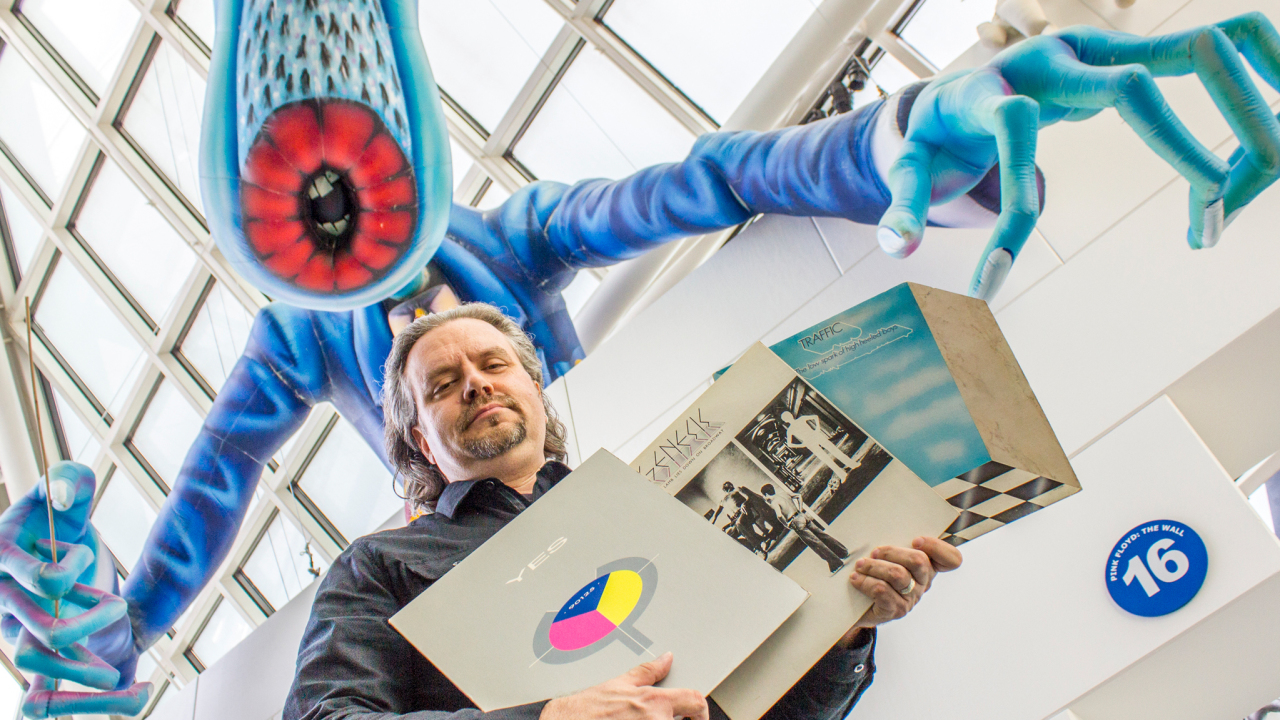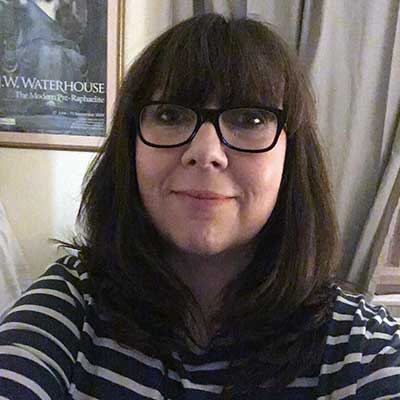I remember my first taste of prog very clearly.
It was Long Island, 1984. I was just about to go to high school, aged 14 years old and a Beatles fan. I heard Owner Of A Lonely Heart on the radio and that song made me buy Yes’ 90125. Nowadays 90125 gets looked at as a very pop album. But to a 14-year-old it was so fresh and so different. Other tracks like Hold On, Changes and Leave It, hearing all the voices combining, it was complex but catchy so it pulled you in. 90125 is one of the albums in my life that I played through multiple vinyl copies – it taught me that you can destroy a piece of vinyl, ha ha!
It changed my listening and it did something else. My Uncle Greg heard me listening to that and he said, ‘That’s Yes, right? Next time I come over I’ve got a bunch of records that I’m going to give you that you have to listen to.’ He gave me Close To The Edge first and even though it sounded very different to 90125 it drew me in right away. He also gave me Jethro Tull, Jefferson Starship and Meddle. Then he gave me Traffic’s Shoot Out At The Fantasy Factory. To this day that stands out. Good vocals, good melodic lines… many people want to define prog by its complexity, and that’s part of it, but also having a good hook and sound that goes with it. You’ve got a song like Roll Right Stones with moments that drop out, slow down, a great bassline, multiple sections… it’s a 13-minute song! I don’t think it’s a concept record but I made my own story from looking at the vinyl with the cut-outs on the cover and the really trippy picture. It ends with Sometimes I Feel So Uninspired, which seems like a good wrap-up to the theme.
In 1986 I picked up Peter Gabriel’s So. I hadn’t got into Genesis too much; I knew Abacab from the radio. I was hooked by Sledgehammer but while I was listening to it there were other tracks such as Don’t Give Up with Kate Bush and We Do What We’re Told. I thought, ‘wow, this Gabriel guy’s got something cool going on here!’. Then I bought Security and Melt and got really into the art rock sound of the back catalogue. I was 16 and starting to like records that challenged me, and the next record that changed things for me again is The Lamb Lies Down On Broadway. A double record in a freaky sleeve, in the gatefold was the story that Gabriel had written and made no sense! Then you pull the records out and the lyrics are on there. This was a treasure trove.
In the late ’80s my music tastes were very eclectic. I did a PhD on industrial rock, so one minute I’m listening to Ministry, Front 242 and Throbbing Gristle, the next I’m meeting people at college interested in prog rock. A big Rush fan lived in my dorm and he turned me on to them, and because I was listening to a lot of synthesizer industrial stuff, Grace Under Pressure stuck with me. It’s great, synth-heavy stuff, plus Alex Lifeson’s guitar sounds so biting. Some tracks had a reggae vibe that The Police were using. Next I got into a group that opened up my love for kosmiche music – Can. What they were doing rhythmically, playing with different layers and textures, I’d choose Tago Mago for Halleluwah alone. It’s 18 minutes long and it doesn’t feel it at all, constantly pulling you into its next moment. Jaki Liebezeit is one of the most underrated drummers in rock and roll.
In the last 15 years or so new bands haven’t been ashamed to show their love of prog. They want to go back to multipart songs, concept albums, and a complexity that takes rock and roll and stretches it. The first record that signaled to me that that was coming down the pike again is Radiohead’s OK Computer. I was teaching music at the time, Creep was a bit hit song, and a student gave it to me saying, ‘I think you’ll love this from the stuff you’re teaching in class’. My first instinct was shock at how much like Floyd it sounded. It’s fairly clichéd to say how amazing it is, but I can’t deny how important that record is, going back to the experimentation that had already happened years ago and doing it in a contemporary environment with success.
My favourite current bands are Coheed And Cambria and The Dear Hunter. With Coheed, it’s all about Good Apollo, I’m Burning Star IV, Volume Two: No World For Tomorrow. Someone I work with told me to check them out when they came to the Rock Hall in 2008. They played a bunch of acoustic tunes and I was like, ‘this is really good.’ I bought the album right away. It felt new again to me like 90125, or OK Computer. Then I went to see them the next year and opening for them was The Dear Hunter – so I bought Act II: The Meaning Of, & All Things Regarding, Ms Leading. That’s a record where you open it up and there’s all these things that you pull out and it flashed me back to The Lamb…. Casey Crescenzo is such a good songwriter, and prolific. They are still out there making records – last year’s Migrant is very orchestral, reminding me of Yes with Time And A Word.
More prog is being inducted into the Rock Hall; I’m hopeful that Yes would be one day. A lot of this has to do with tastes changing – prog went out of favour, now people are looking at it in a different way. It’s escapist and beautiful, but can also be poignant and talk about important things. It endures and can be shared. At gigs I see generations of families there and I recently went to Yes with my daughter, who plays bass, so that proves a point, right? Over the years I’ve interviewed people such as Yes, Asia and Alan Parsons. I have been nervous, particularly when it’s Yes. You try to be professional, then there’s a 14-year-old boy inside screaming: ‘I’m on stage with my idols!’ I’m a very lucky man.”
Visit the Rock Hall at www.rockhall.com. Jason’s book We Rock! A Fun Family Guide For Exploring Rock Music History is out in November via Quarry Books, see http://bit.ly/1lQ0pOd.
- Meet the best turntables for your record collection
- Smaller budget? No problem! These are the best budget turntables

